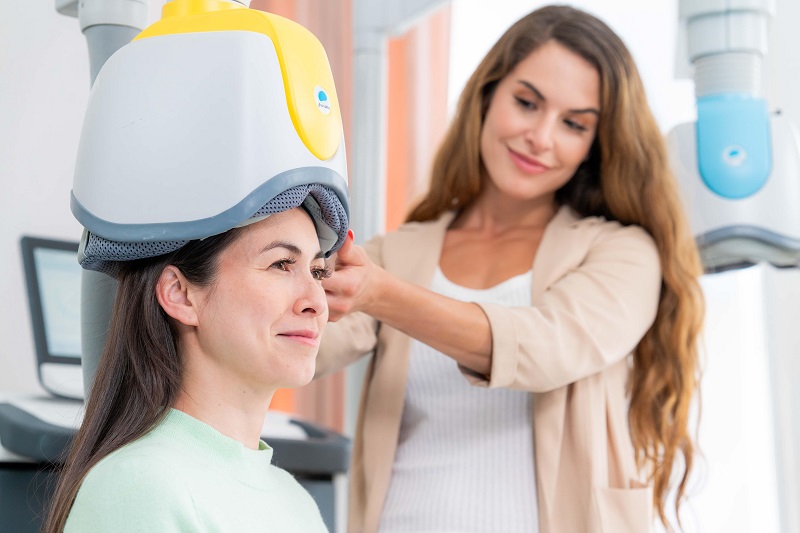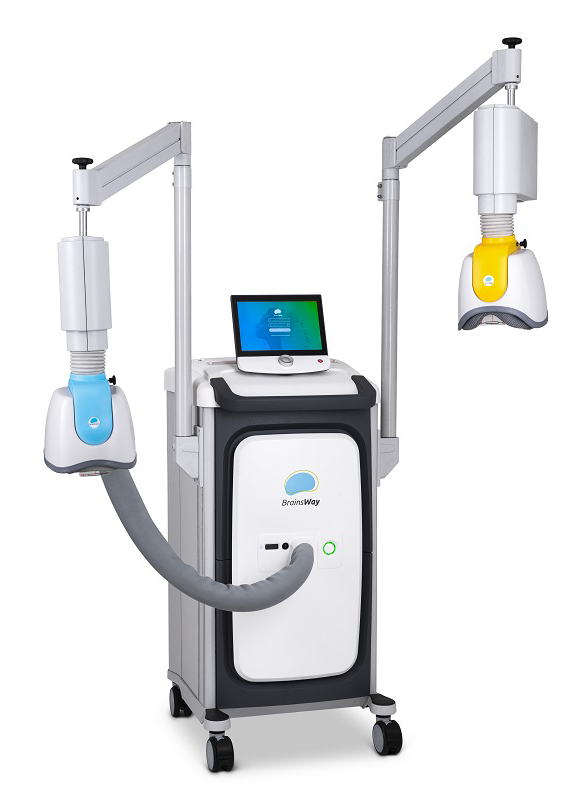
Struggling with Depression or OCD? Medication not helping?
There is hope.
Although antidepressants can be effective for many patients, they do not work for everyone. More than 4 million patients do not receive adequate benefit from antidepressants and/or cannot tolerate the side effects. Transcranial magnetic stimulation (TMS) therapy offers you hope and new beginnings.
TMS therapy was cleared by the Food and Drug Administration (FDA) in 2008. Aspen Counseling, a division of Rosecrance, was the first provider of TMS therapy in northern Illinois.
We utilize TMS therapy for major depressive disorder (MDD), anxious depression, and obsessive-compulsive disorder (OCD). TMS therapy is covered by most major insurance.
“I struggled intermittently with depression and anxiety for 30 years. The last few years, depression and anxiety episodes were increasingly severe and frequent, and medications were increased and added without desired results. TMS was truly a blessing for me. I feel strong and confident. I was able to go from four different medications down to one medication.” –Sandi, TMS patient
The Process
What happens during TMS therapy?
During TMS therapy, pulsed magnetic fields are repetitively transmitted into the left prefrontal cortex, the part of the brain that is thought to regulate mood, to stimulate the firing of neurons (nerve cells). It triggers a cascade of neurochemical events, including the release of neurotransmitters (such as serotonin, norepinephrine and dopamine), and helps normalize neurotransmitter function.
How long does a patient undergo TMS therapy?
The typical initial treatment course consists of five treatments per week over a six-week period, for an average of 30 treatments. Each treatment session lasts approximately 20 minutes, and flexible scheduling is available.
An Aspen Counseling psychiatrist supervises the delivery of TMS Therapy in our office. Anesthesia or sedation is not required. You will be awake and alert during the treatment session.
TMS therapy is individualized to ensure the highest level of care for each client. Total treatment sessions will be determined based on medical necessity.
“TMS is at the cutting edge of treatment for neuropsychiatric disorders. It is safe, cost-effective and offers new hope to those who have hit a wall in their search for relief from their symptoms.”
–Dr. Raymond Garcia, Aspen Medical Director

Teens and TMS
TMS therapy is well tolerated in adolescents and can often have fewer side effects than anti-depressants. Although TMS is FDA-approved for individuals ages 18 and older, TMS therapy for teens is supported by the American Academy of Child & Adolescent Psychiatry. Multiple studies have shown it to be effective and safe for children and adolescents.
TMS can also be easily integrated into a young person’s school or other schedule because the noninvasive treatment allows individuals to resume everyday activities immediately after a treatment session.
Consult the Aspen Counseling staff to learn if TMS therapy can be approved by your insurance or to discuss payment options.

Pregnancy and TMS
Pregnancy can affect emotional regulation and add stress to the lives of people living with depression and anxiety. TMS therapy is an option to consider for individuals who are pregnant as an alternative to medication or as additional support.
Studies have shown that TMS is considered a safe option for pregnant women. Our Aspen Counseling team has cared for many pregnant individuals who have had success with TMS therapy during pregnancy.
Minimal Side Effects and Risks
The most common adverse reaction related to treatment was mild-to-moderate scalp pain or discomfort at the treatment site. The incidence of this side effect declined markedly after the first week of treatment.
Regarding long-term safety, TMS uses the same type and strength of magnetic fields as MRIs, which have been used with millions of patients around the world and have not been shown to cause long-term consequences.
TMS therapy should not be used in patients with implanted metallic devices or non-removable metallic objects in or around the head. It also should not be used in patients with implanted devices that are controlled by physiological signals such as pacemakers.

Benefits of TMS
- In clinical trials, 1 in 2 patients had significant improvement in symptoms and 1 in 3 had complete symptom resolution.
- TMS is non-systemic, so it doesn’t have side effects such as weight gain, sexual dysfunction, nausea, dry mouth or sedation.
- Furthermore, when undergoing TMS at Aspen Counseling, you have the support of Aspen Counseling therapists, counselors, and psychiatrists. We will coordinate care with your current psychiatrist. If you do not have a treating physician, we are always accepting new clients.
Why Choose TMS Therapy at Aspen Counseling?
- TMS therapy is noninvasive and does not involve surgery. You remain awake and alert during the treatment and can resume everyday activities afterward. It is also non-systemic; unlike most medications, it is not taken orally and does not circulate in the body’s bloodstream.
- Aspen Counseling was the first provider of TMS therapy in northern Illinois. TMS therapy is performed in our office under the supervision of board-certified psychiatrists.
- Aspen offers comprehensive consultations. During these consultations, you will have the opportunity to tour our facility, see the TMS chair, and discuss options with our staff.
- We schedule TMS sessions at your convenience, and we do offer early-morning and evening appointments.
- We offer several payment options and will work with you to help determine insurance eligibility and secure the coverage/funding needed as quickly as possible.









